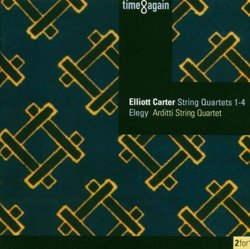Carter's quartets, the finest of the late 20th century!
R. Hutchinson | a world ruled by fossil fuels and fossil minds | 08/12/2005
(5 out of 5 stars)
"The Arditti Quartet was the first to record Elliott Carter's first four string quartets -- this is the reissue of those recordings, originally on two separate discs, released in 1989. No remastering has been done, only the packaging is improved, with an elegant slimline disc, new cover art, and some new photos. The original liner notes on the quartets by David Harvey are retained, but there is a brief update on the Arditti Quartet. With the Sony disc of the Juilliard Quartet's 1991 recordings out of print, this reissue comes just in time. If you want to hear the finest cycle of string quartets of the late 20th century, don't miss it.
The Arditti Quartet's Carter is more fiery and energetic than the Juilliard Quartet's (see my review). By comparison, the Ardittis sound a bit crazed and frenetic. Comparing in the other direction, the Juilliards sound a bit stolid and pompous. To put it in more positive terms, the JQ version is weightier, more serious. The Sony disc has better sound quality, and much more extensive liner notes. But this recording is a must both for devotees of Elliott Carter, and for devotees of the Arditti Quartet.
Look too for the Arditti Quartet's recording of Carter's Quartet No. 5 on Montaigne (see my review) -- it's the only one."
1+3:excellent 2+4:cerebral
Peter Heddon | 10/25/2005
(4 out of 5 stars)
"Quartets 1 and 3 are the more immediately exciting.The latter might be fiendishly difficult to negotiate with the quartet divided into a pair of contrasting duos (never playing the same material) but the results are not in the least bit dry.I love the pizzicato writing which gets going after the rampaging opening.Intonation is frequently askew but the perfrormance has plenty of attack.
No.1 nearly breaks out into Shostakovich territory 3minutes into the last movement.This is the most visionary of the quartets."
Carter's string quartets are often excellent examples of his
Christopher Culver | 12/04/2008
(4 out of 5 stars)
"Elliott Carter's string quartets have come at key moments of his career and often have heralded some important stylistic evolution. That's why this recording where the Arditti Quartet performs is so important for fans of the composer. The lineup of the Ardittis here are Irvine Arditti and David Alberman on violins, Levine Andrade on viola, and Rohan de Saram on cello.
The String Quartet No. 1 (1951) marked the beginning of Carter's mature career as a brazen modernist. Cast in three movements, this is music constantly on slippery metrical slopes with astringent harmonies. But what sounds so wild and out there at the beginning of hearing this collection sounds remarkably tame and traditional if you go back to it after hearing the later string quartets, especially the last movement "Variations" which approaches the "kinder, gentler modernists" who arose in the '70s and '80s.
It's with the String Quartet No. 2 (1959) that we find Carter's mature style, where instrumental lines are maximally separated in order to create the atmosphere of a dialogue. This is often called Carter's masterpiece, and it won a load of prizes, but I just don't enjoy it much at all. It just meanders. However, the String Quartet No. 3 (1971) is very impressive. It has the ensemble seated apart, split into two duos (violin and viola, violin and cello) which stay entirely in their own metrical and harmonic universes. It is a piece of constant action, sure to entertain if you are a fan of Carter's other busy pieces like the Piano Concerto. The String Quartet No. 4 (1986) has often been called the most enigmatic of all Carter's quartets, but I like it a lot. Though cast in a single movement, it consists of many varied sections, and abounds in references to the classical tradition. This work of Carter's late period also has much clearer textures, but with the same sense of rhythmic zest.
Elliott Carter's string quartets are often touted as the quartets to beat all others in the latter half of the 20th century, but I warn you that not all will find these the cat's meow, even if you enjoy a steady diet of modernism. Personally, I get more from Per Norgard's Fifth, Gubaidulina's Second, or Rihm's Third than any of the Carter quartets. And in fact, I find Carter's most entertaining string quartet to be the Fifth, which appeared a few years after this recording (the Ardittis perform it on a Naive/Montaigne disc). That's why I give the collection four starts instead of five, to try to tone down the hype."


 Track Listings (2) - Disc #1
Track Listings (2) - Disc #1